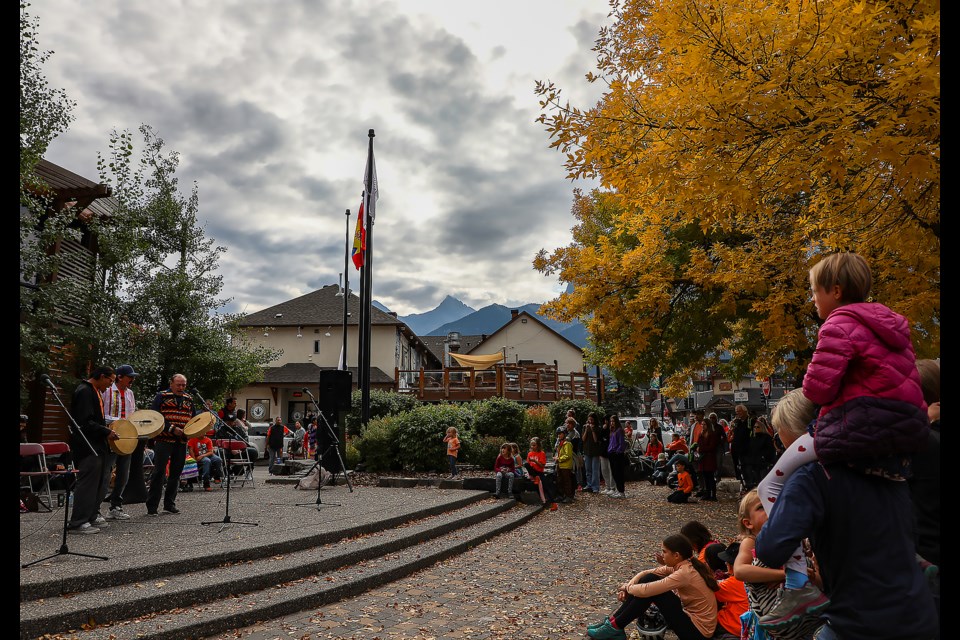BANFF – The Town of Banff has endorsed its Indigenous framework following a period of public feedback on the new guiding policy document.
Changes to the framework, which will help direct the Town in being respectful, cooperative and active partners in reconciliation, include new or updated areas of focus on cultural protocols, supporting employment and business development opportunities and accountability.
“There was a great deal of curiosity about it in terms of how it was framed up, and we did make some changes relative to those comments,” said Randall McKay, manager of strategic initiatives and special projects with the Town of Banff at the April 24 council meeting.
“The essence of reconciliation is a sustained process of engagement; I think council knows that. [It’s about] mutual respect, acceptance and dialogue with Indigenous peoples, and long-term relationship-building and healing, as opposed to just a straight outcome to be achieved on one day or one point in time.”
The framework is considered a living document, meant to evolve alongside ongoing discussions with Indigenous peoples.
Of those who submitted comments during the document’s first public feedback period, only a handful chose to do so in writing. Most suggestions were heard over the phone or in-person, McKay noted.
One of the revisions made was to Métis cultural protocols, to include information on the offering of tea in lieu of tobacco to Métis elders and traditional knowledge keepers.
That section was also updated to include more information in regard to the process of conducting ceremonies related to smudging and burning of ceremonial pipes.
Additionally, accountability was pointed out as an important piece of the framework that was not formerly mentioned.
“This was added as a standalone point in the document. It was raised by a community member and it’s a good point because it’s a key piece to the whole process,” said McKay. “[This isn’t] just a static document, you want to be able to act on it and move forward, and account for our actions as we implement the many recommendations.”
The framework's development primarily involved consultation with Indigenous advisors and traditional knowledge keepers. Those involved in crafting the document emphasized the importance of providing people an opportunity to give feedback.
Another change recommended was to remove the word ‘commemorative’ from the framework’s title.
“That has come up before, but again we saw some comments asking, ‘why commemorative?’ It is more than just that. It’s not just looking back, it’s also looking forward,” said McKay.
“Those were the main points of what feedback was received and acted upon. There were also comments and questions around authenticity and some of the retailing practices in the community that the framework can’t quite deal with, but we tried to act on everything we heard from the community with regards to what we could put in the framework. It was helpful and useful feedback.”
The 43-page draft document covers eight sections, beginning with its introduction and purpose, followed by objectives, key actions, commitments and implementation. It also includes a long list of acknowledgements and appendices.
At the framework’s core are seven guiding principles – the Seven Sacred Teachings of respect, honesty, wisdom, love, humility, truth and courage.
Coun. Barb Pelham asked about next steps of the framework such as how it will be shared and who it will be shared with.
McKay said the Town’s communications team first needs to build out the document with graphic tools before it will be formally shared, but once it’s ready, the Town will make it available on its website and through various channels.
“I think there will be a multitude of things that will happen [through this framework] and we’ll work with communications on how to best push that out.”
With respect to implementation, McKay noted the Town is already moving on many of the recommendations.
Earlier in the day at council’s governance and finance meeting, the framework was referenced during a discussion about free parking for Indigenous peoples in the Banff townsite.
The intent of the framework is to act as an informed departure point for these kinds of discussions to take place at council, but it’s also available to any interested community groups to implement.
Some individuals, McKay said, have already reached out to seek direction from the framework with respect to cultural protocols at local events.
Council praised those involved, from the Town, various Indigenous groups and other community members, for the approach and effort in building the document.
Engagement will be ongoing with partners from Treaty 7 First Nations, including the Blackfoot Confederacy, Îyârhe Nakoda First Nation and Tsuut’ina First Nation, as well as the Métis Nation of Alberta Region 3, and Ktunaxa Nation and Tk’emlúps te Secwépemc Nation in B.C.
“I would just echo the huge thank you to all those folks who gave their time, talent and their wisdom toward putting this together,” said Mayor Corrie DiManno.
“I know it’s been a couple-year endeavour, and I want to thank you for your steadfast commitment to this project and the deep respect that you’re able to nurture with our Indigenous partners and leaders,” she said. “That’s something that not everybody can do and you do it so magically, and you’ve woven it together to bring us this beautiful framework.
“I’m really looking forward to seeing how this helps us into the future as we journey toward truth and reconciliation.”
The Local Journalism Initiative is funded by the Government of Canada. The position covers Îyârhe (Stoney) Nakoda First Nation and Kananaskis Country.




